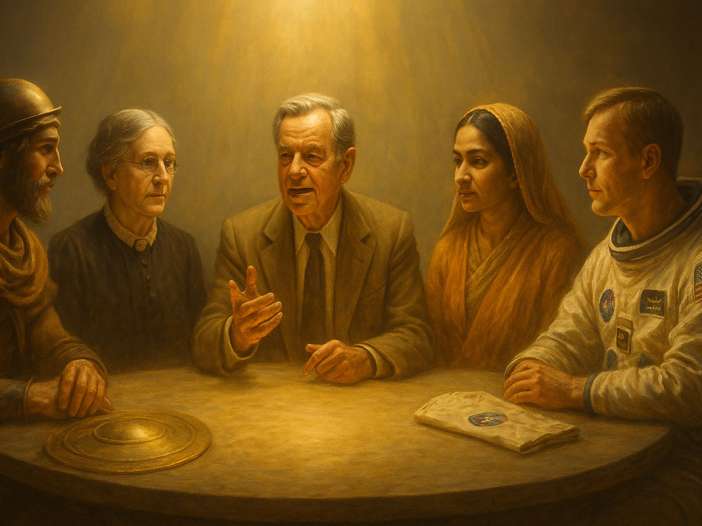
|
Getting your Trinity Audio player ready...
|
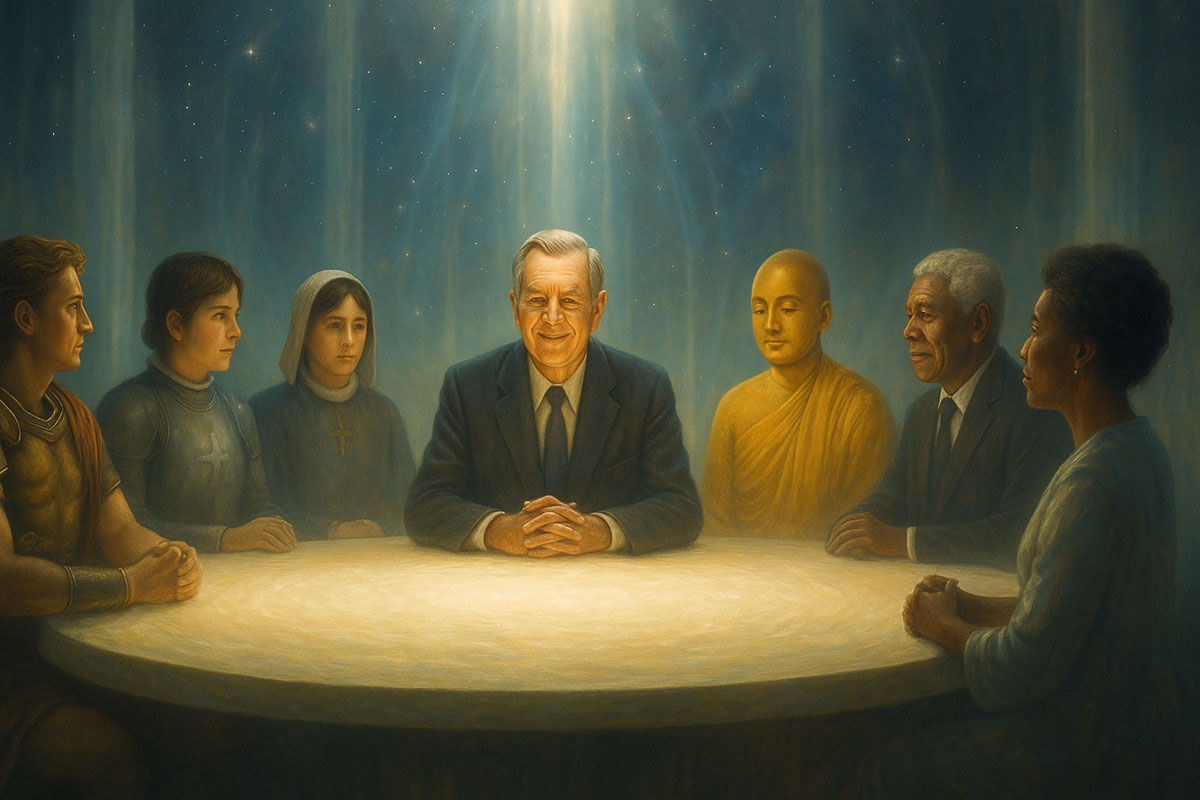
When I studied the myths of humanity, I found that no matter where I looked—whether among the stories of the Greeks, the Vedas of India, the wisdom of Africa, or the folktales of Native America—there was always a single underlying rhythm: the call, the trial, the transformation, and the return. I called it the monomyth, the Hero’s Journey, for it showed itself in countless guises.
But here, in this hall beyond life and death, the pattern unfolds in a way I could never have fully foreseen. The heroes who gather in these conversations are not defined by their survival, their glory, or even their earthly triumphs. They are voices from beyond, bearing the weight of sacrifice, regret, and unfinished journeys. Some never returned home. Some fell before they could taste the fruits of their struggle. Some carried burdens of grief or shame that followed them past the threshold of life.
And yet, their voices reveal that the journey never ends with death. The meaning of their lives does not vanish with their final breath. Instead, it ripples outward—into memory, into song, into dreams, into the struggles of those who walk after them. It is here that the Hero’s Journey transcends the individual and becomes something larger: a conversation between the living and the dead, between myth and memory, between humanity and the eternal.
This gathering is not of legends alone but of archetypes—warriors, seekers, martyrs, visionaries—who reflect on what their unfinished journeys mean for us. They reveal not only what it is to be heroic, but what it is to be human: vulnerable, striving, uncertain, yet forever reaching for light. Here we listen, not to tales of conquest, but to whispers of wisdom that echo long after the hero has fallen.
(Note: This is an imaginary conversation, a creative exploration of an idea, and not a real speech or event)

Topic 1 — What Does It Mean to “Return” When You Don’t Survive?
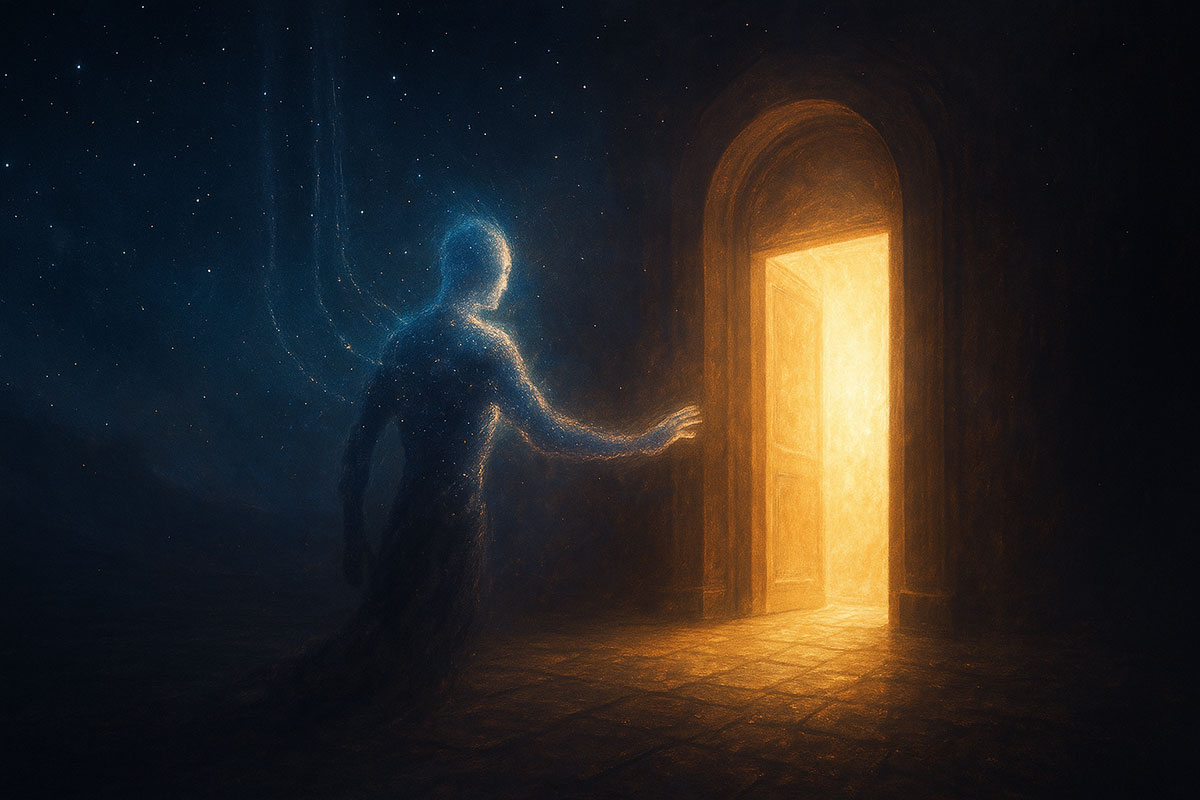
Joseph Campbell (Moderator):
When I spoke of the Hero’s Journey, I described the cycle of departure, initiation, and return. Yet many of you did not return to your earthly home. You were struck down before the final stage. My question is: what does “return” mean for a hero who does not live to see it?
Achilles:
For me, return was never to be literal. I was given a choice: a long, ordinary life or a short, glorious one. I chose glory, and thus my “return” is through story. Every time a soldier sings of me, every time a boy learns my name, I am present again. I never walked back to my homeland, but the song itself became my homecoming.
Joan of Arc:
I burned before the cathedral bells could ring in victory. Yet, I see now, my return was never for myself. France remembered me, though I did not march again. My “return” is in the faith I left behind, in the way others believed that a peasant girl could carry God’s banner. Death closed the gate of my life, but belief kept opening doors for others.
Martin Luther King Jr.:
I spoke of the mountaintop, of seeing the Promised Land. But I was taken before I could walk into it with my people. My return is not in body but in dream. Children who judge one another not by skin but by character—that is my return. The dream breathes where I no longer do.
Anne Frank:
I never returned to my house on Prinsengracht. The world became smaller, darker. But my diary, my words, returned when I could not. They walked where I could not walk. They have traveled farther than I ever imagined, reaching children like me across the globe. My return is the life my words keep living.
Amadou Diallo:
I was no warrior, no prophet, just a young man reaching for his wallet on a dark street. My return came not through my steps but through the voices that cried out after I fell. My mother’s grief, the marches, the songs sung in my name—these became my homecoming. My blood returned as fuel for justice.
Joseph Campbell:
Thank you. Each of you suggests that return does not end with the body. Let me ask you this: if you could have lived long enough to see the world you hoped to build, what would that have meant to you? Would your journey feel more complete?
Anne Frank:
To live… I would have written more. To have seen the world healed after so much hatred would have been a joy. But perhaps I needed to stop where I did, so my words remained the voice of youth, frozen in time. My incompleteness became my completeness.
Achilles:
Had I lived to grow old, I might have been forgotten. Heroes are remembered because they die young, like sparks that vanish but leave the smell of fire. Yet part of me wonders: what would it have been like to hold my child, to plant olives instead of wielding spears? That return is unknown to me.
Martin Luther King Jr.:
Yes, to see it with my eyes would have been sweet. But my work was never mine alone. The arc of the moral universe is long, and others were destined to carry it forward. Perhaps I was not meant to see the dawn, only to announce it was coming.
Joan of Arc:
If I had lived to see France freed in my lifetime, I might have been crowned in joy, but I would not have been canonized in fire. My death gave my life its echo. Still, I feel the ache of the girl I once was—longing simply to return to the fields of Domrémy.
Amadou Diallo:
I did not ask to be hero or symbol. I wanted to live. I wanted to see my mother again, to live a quiet life. And yet, I see now, my unfinished return gave others the courage to keep walking. Perhaps the journey I could not finish became the journey of others.
Joseph Campbell:
Your words move us to consider that sometimes the hero’s absence is itself the return. But let me ask one final question: what wisdom would you give the living about carrying the boon of those who did not come back? How can humanity honor the unfinished journeys?
Martin Luther King Jr.:
Carry the dream as if it is yours. Do not wait for heroes to return—they live within you. Every time you choose love over hate, you let the hero return through your hands.
Joan of Arc:
Listen for the voices that call you higher, even if the world mocks you. Do not be afraid to fight for what is just, even if you do not see the victory yourself. Your faith will become another’s return.
Achilles:
Glory is not in death, but in courage. Choose to face your battles fully, even knowing you may not return. For the song is sung not of the safe, but of the brave.
Anne Frank:
Write your truth. Even in small rooms, even in dark times, your words may return when you cannot. Do not underestimate the power of a single voice.
Amadou Diallo:
Remember the ordinary ones who became symbols through no choice of their own. Say their names. March for them. Let their unfinished returns be carried in your steps toward justice.
Joseph Campbell (closing):
We see now that “return” is not always the hero’s own footsteps, but the echo of their life in the world they leave behind. A return unfinished in flesh may still be completed in spirit—through words, through dreams, through remembrance, through justice. The hero does not always return home, but the world is never the same after they have walked through it.
Topic 2 — Sacrifice and Immortality: Who Truly Lives Forever?
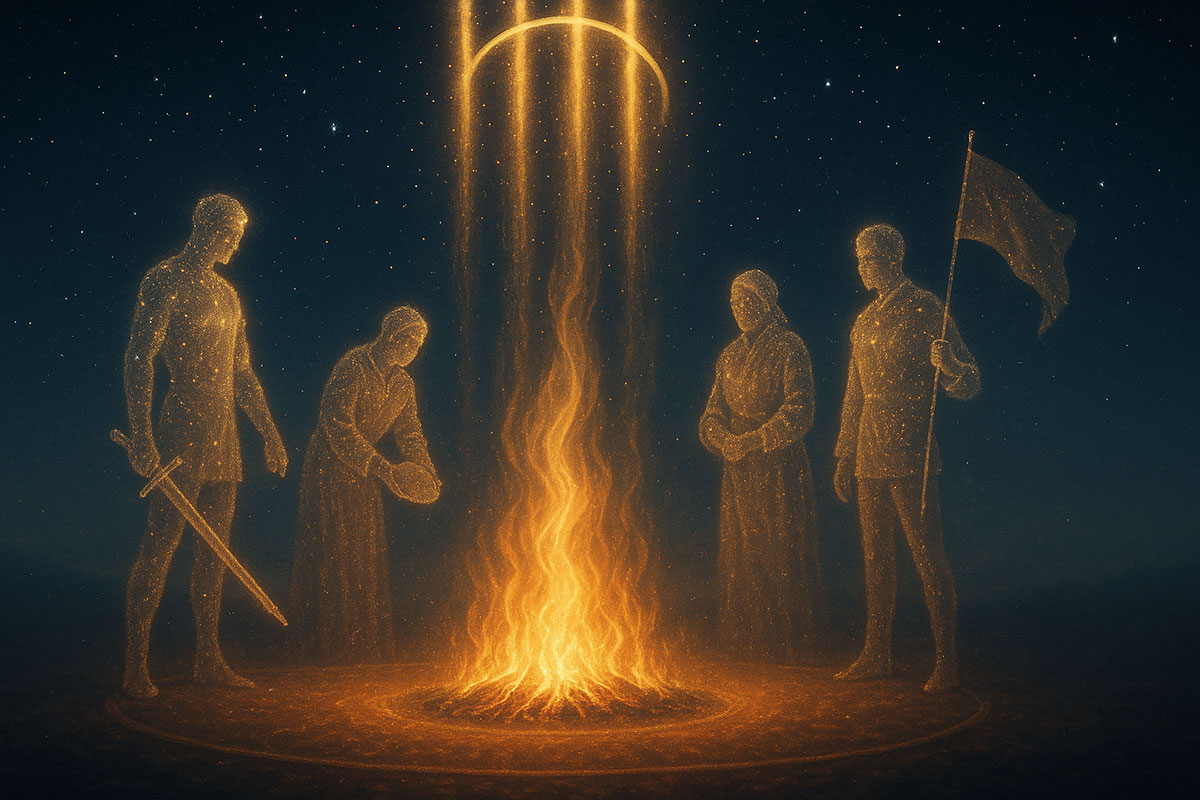
Joseph Campbell (Moderator):
In myths and in history, the hero often pays with their life. But I wonder: is it this sacrifice itself that grants immortality? Or is it something else that ensures their legacy? Let us begin here—what is the relationship between sacrifice and immortality?
Jesus:
My sacrifice was not for myself, but for others. In dying, I opened a path toward life everlasting, not only in heaven but within the hearts of those who believe. Immortality does not rest in flesh but in the spirit awakened in others. Sacrifice, when rooted in love, plants seeds that bloom beyond time.
Siegfried:
In my tale, I was slain in treachery, even after my strength had conquered dragons. Yet my death sang louder than my life. The bards did not forget me; they sang of my courage until kingdoms rose and fell. Immortality comes not because one dies, but because death makes the song unforgettable.
Harriet Tubman:
I lived long, yet each time I returned to the South to lead others to freedom, I risked death. Every step was sacrifice. Immortality is not only for the slain; it is also for those who laid down their lives in pieces, day after day, for the sake of others. My life became larger than myself because I kept giving it away.
Che Guevara:
A bullet ended me in Bolivia, but my face went on flags, walls, and t-shirts. My death turned me into a symbol bigger than the man I was. But symbols can be twisted. Immortality without truth is dangerous. Sacrifice may ignite a flame, but what people do with that fire determines whether it warms or destroys.
Hector:
I faced Achilles knowing death was certain. Still, I stood to protect my people, my city, my family. Immortality was never my concern—it came through the dignity of that choice. The bards remembered not only Achilles, who killed me, but Hector, who died with honor. In sacrifice, one leaves behind a measure of soul that time cannot erase.
Joseph Campbell:
Thank you. You each suggest that sacrifice is inseparable from meaning. Let me press further: if you had lived, if death had not claimed you when it did, would your legacy be as enduring? Or is death itself the very thing that preserved you?
Harriet Tubman:
I believe my legacy is in freedom, not in death. I lived long enough to see slavery end, and yet, if I had fallen sooner, I trust others would have carried my mission forward. Death may polish the statue, but the work of love is the true stone.
Jesus:
Had I not been crucified, perhaps my teachings would have spread differently, more slowly. Yet the cross became a symbol that carried my words across centuries. My death was not the end of my story—it became the key that unlocked it.
Che Guevara:
My image became immortal because I was cut down. Had I lived, perhaps I would have been forgotten, or my failures remembered more than my triumphs. Death froze me in the imagination of the world. Immortality is sometimes a mask that death paints on a mortal face.
Siegfried:
Yes, death gave me permanence. Heroes who live fade into memory as men; heroes who die young remain eternal as legend. The Nibelungenlied kept me burning in the minds of those who never saw me alive.
Hector:
I would have grown old in Troy, perhaps forgotten in its ashes. But in death, I became its eternal defender. My mortality was my immortality. The poet gave me the return my body could not.
Joseph Campbell:
You touch on a paradox—that death both steals and preserves. So, my final question: what would you tell the living today, who fear sacrifice and cling to comfort, about the true path to immortality?
Siegfried:
Do not fear the dragon, nor the treachery behind you. Immortality lies not in how long you live, but in how fiercely you live true to yourself.
Harriet Tubman:
Immortality is not in dying, but in what you free while living. Risk your safety for another’s life, and you will never be forgotten. Freedom itself is eternal.
Che Guevara:
Do not chase symbols, for they are fleeting. Chase justice, and if death meets you there, then your face may live on with truth. If not, you will live in obscurity, which is its own kind of honesty.
Hector:
Stand for something greater than yourself, even if it costs you everything. Immortality is the echo of your courage in the hearts of those you defend.
Jesus:
Love one another. Lay down your life, not always in death, but in kindness, mercy, forgiveness. Whoever loses their life for love’s sake—whether in daily sacrifice or final breath—will find it everlasting.
Joseph Campbell (closing):
We see here that sacrifice is the thread that weaves mortal lives into eternal stories. Whether through death or daily risk, whether remembered in scripture, song, or silent hearts, the hero’s gift is never lost. Immortality is not the reward of death—it is the harvest of a life lived in service to something greater.
Topic 3 — Regret and Redemption Beyond Death
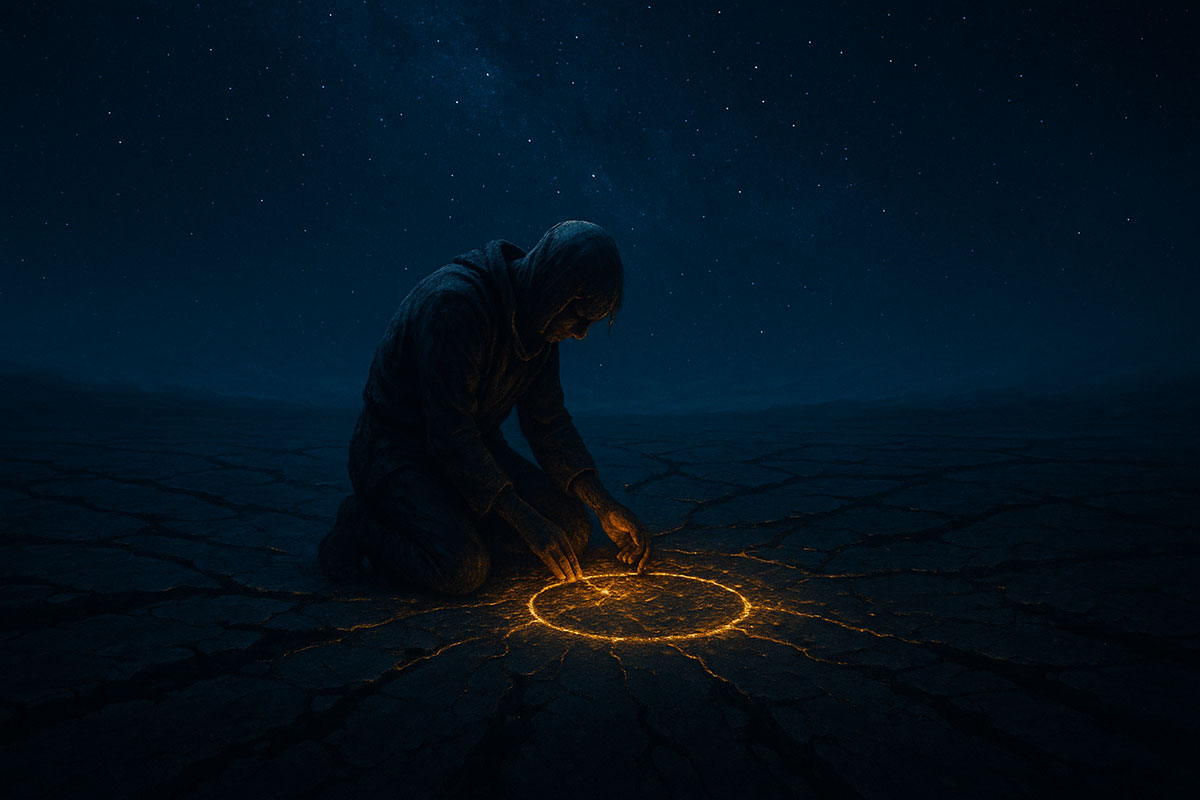
Joseph Campbell (Moderator):
In the Hero’s Journey, the ordeal often brings both triumph and tragedy. Yet even heroes may die carrying burdens of regret. Tonight, I ask you: when the journey ends in sorrow or guilt, what becomes of those regrets in the afterlife? Can redemption still be found?
Arjuna:
On the battlefield of Kurukshetra, I was torn between duty and love. I killed my kin, my teachers, my brothers. Though Krishna guided me, the bow in my hand still felt heavy with blood. In this world beyond life, I see that my regret was not mine alone—it was the burden of humanity learning what duty costs. Redemption lies in understanding, not forgetting.
Simba:
I carried guilt for years, believing I had caused my father’s death. Even after truth came, the shadow of shame lingered. My redemption was not in escaping it but in facing it, roaring into the night sky that I was my father’s son. Regret, I learned, is the teacher that drives us to reclaim who we are.
Oedipus:
Regret was the air I breathed. To kill my father and wed my mother—though fate decreed it—left me blind long before I tore out my eyes. In death, I see the curse differently: it was not punishment but revelation. My story still warns, still teaches. Redemption for me is not release but usefulness: that my suffering becomes wisdom for others.
Princess Diana:
My regret was leaving my sons too soon, leaving my life unfinished. The glare of cameras stole much, but I regret most the moments I did not get to share as a mother. Redemption comes in the love they still carry, and in the compassion people remember. My life ended in pain, but my legacy was kindness, and kindness does not die.
Kurt Cobain:
I left with more regret than I could count. Regret for the noise in my head, regret for the daughter I didn’t stay to see grow. I thought escape was release, but death doesn’t erase regret—it magnifies it until you face it. Here, I’ve found redemption not in being forgiven by others, but in finally forgiving myself.
Joseph Campbell:
Your words remind us that regret is as universal as triumph. Let me ask you this: if you could return to your life for one moment, to undo or change a single choice, what would it be?
Simba:
I would have spoken the truth sooner, trusted my friends instead of running. My silence let the shadows grow too long.
Princess Diana:
I would have chosen privacy over duty more often. I gave too much to the world and not enough to myself and my children.
Kurt Cobain:
I’d go back to that last night, put down the gun, and let someone sit with me through the darkness. Just one night longer might have made all the difference.
Oedipus:
I would have listened to the warnings of the gods, though perhaps no choice could undo my fate. Yet maybe I could have walked with more humility, less pride in the face of destiny.
Arjuna:
I would not undo the battle, for dharma demanded it. But I would have prayed deeper, mourned longer, embraced my fallen kin in spirit, instead of burying grief beneath duty.
Joseph Campbell:
Powerful reflections. Now, my final question: what wisdom would you give to the living about how to carry regret without being destroyed by it, and how to find redemption even when mistakes cannot be erased?
Princess Diana:
Let compassion be your compass. When regret comes, pour yourself into love for others—it transforms pain into healing.
Arjuna:
Do not fear regret; it is a companion on the path of duty. Listen to it, and let it sharpen your awareness of what truly matters.
Kurt Cobain:
Don’t hide your pain. Share it before it drowns you. Redemption comes when regret is spoken, when it’s heard by someone who cares.
Oedipus:
Know that no life is free of error. Even kings fall to fate. Redemption lies not in undoing the past, but in turning suffering into guidance for others.
Simba:
Remember that guilt and regret are not chains forever. They are signposts pointing you back to who you were meant to be. Step into the circle of life, even if you’ve stumbled.
Joseph Campbell (closing):
We see now that regret is not the end of the journey—it is part of the path. Redemption, whether in life or beyond it, emerges when we transform regret into wisdom, compassion, and renewed courage. The hero is not flawless; the hero is one who dares to keep walking, even through the weight of mistakes.
Topic 4 — The Collective Hero: Humanity’s Journey
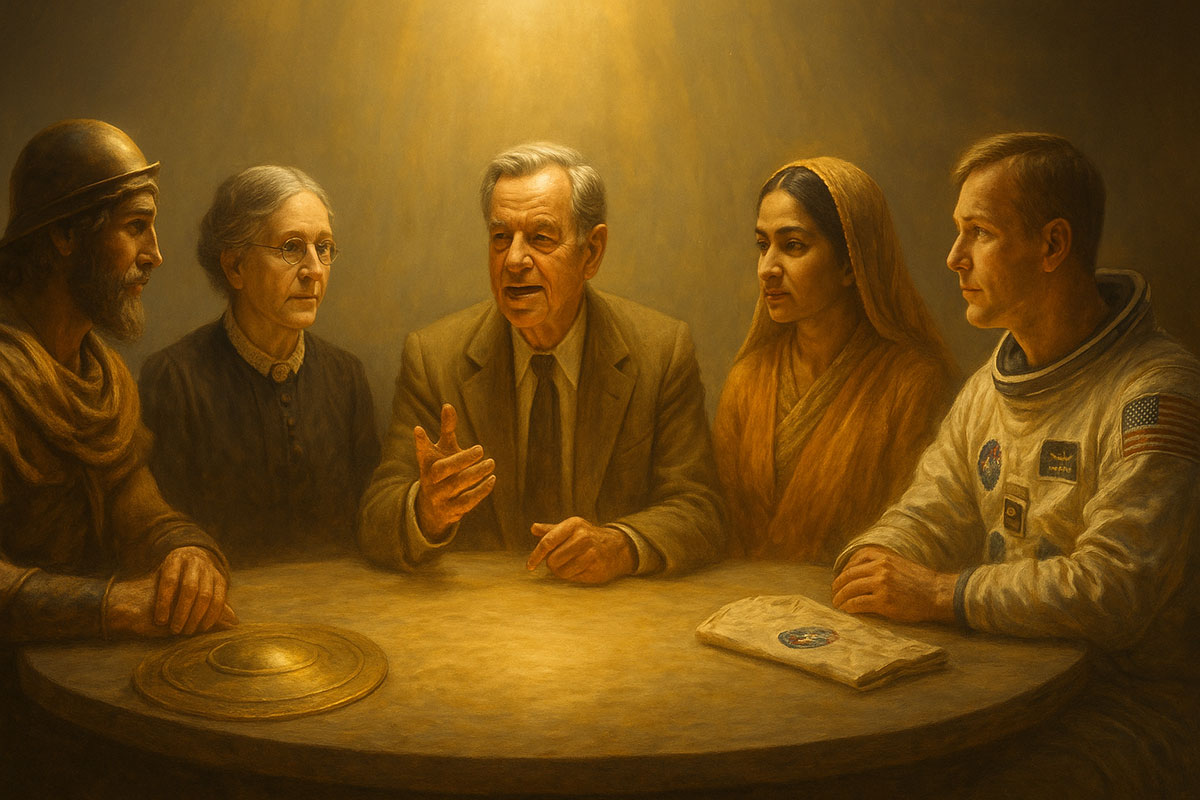
Joseph Campbell (Moderator):
The Hero’s Journey is often told as the story of one individual, yet I have long believed it is also the story of humanity itself. Tonight, I ask you: is humanity, taken as a whole, on a hero’s journey? If so, where are we along the path?
Moses:
I led my people from bondage, but I never set foot in the Promised Land. Humanity now is like Israel in the desert: wandering, tempted, quarreling, yet guided by a promise greater than itself. We have crossed the threshold of knowledge, but the true land of justice and peace remains ahead.
Gandhi:
Yes, humanity is a hero, but one still wrestling with its conscience. We have tasted power, but not discipline; progress, but not harmony. We stand in the middle of the journey, tested by greed and violence. Nonviolence is our trial, compassion our ordeal. Will we embrace them, or perish? That is the question.
Neil Armstrong:
When I stepped onto the Moon, I felt both awe and humility. It was not my step alone but humanity’s. We are a species on the cusp of vast horizons, but our inner journey lags behind our outer conquest. We have left footprints on the Moon, yet we still struggle to walk gently on Earth.
Malala Yousafzai:
Humanity is still a child, learning. Too many girls are denied the right to learn, too many voices silenced. Our hero’s journey is to ensure every child’s potential is free to shine. Until we honor the power of education, we cannot say we have returned with the boon.
Chief Seattle:
Humanity is the child of the Earth, yet it forgets its mother. You walk the path of heroes, yes, but you trample the soil and foul the rivers. A hero must learn respect for all life. Until you treat the Earth as kin, you are not yet heroes—you are still lost wanderers.
Joseph Campbell:
You each speak of humanity as in the middle of the journey, facing its great trial. Let me ask: what do you see as the greatest ordeal that humanity must endure before it can truly transform?
Gandhi:
The greatest ordeal is to conquer violence, not with weapons but with truth. Until the sword is laid down, humanity cannot rise.
Neil Armstrong:
Our ordeal is responsibility. We have gained the power to leave our planet, to split atoms, to remake nature. But without wisdom, that power could end us. Our ordeal is learning restraint.
Malala Yousafzai:
Our ordeal is ignorance. Wars are born from it, oppression thrives in it. Education is the key that turns ordeal into awakening.
Chief Seattle:
The ordeal is remembering we belong to the Earth. If humanity cannot reconcile with its home, the journey ends in ashes.
Moses:
The ordeal is faith—faith that we are not abandoned, that there is meaning in struggle. Without faith, the desert becomes endless. With it, even a wandering people finds direction.
Joseph Campbell:
You name ordeals of violence, power, ignorance, forgetfulness, and despair. My last question: if humanity does succeed, if it reaches its “return with the elixir,” what will that boon be? What treasure will humanity bring back to itself and the universe?
Neil Armstrong:
The boon will be perspective—the knowledge that we are one small planet in a vast cosmos, and that we must care for our fragile home together.
Malala Yousafzai:
The boon will be equality—every child, girl and boy, free to learn, to dream, to shape the future without chains.
Moses:
The boon will be justice, a world where the law serves not kings but the people, and where freedom is no longer a dream but a dwelling place.
Gandhi:
The boon will be peace, not the silence of fear but the harmony of truth and nonviolence. That will be humanity’s true immortality.
Chief Seattle:
The boon will be kinship—the return to knowing that the Earth, the rivers, the animals, and the stars are all relations. When you live as family with all, then you will have truly returned.
Joseph Campbell (closing):
So humanity is indeed a hero, not yet finished but in the midst of its ordeal. The call has been heard, the threshold crossed, but the trial is ongoing. If we endure, if we learn, then our return will be not only for ourselves but for all life. The hero’s journey of humanity is the greatest story of all, still being written with every choice we make.
Topic 5 — The Ultimate Boon: What Treasure Truly Lasts?

Joseph Campbell (Moderator):
In every Hero’s Journey, the return brings back a boon—a treasure, wisdom, or gift for the world. But here, beyond death, I ask you: what treasure truly lasts? When flesh fades and kingdoms fall, what endures?
Buddha:
I left behind no crown, no army, no monument. What endures is awakening—the truth that suffering can be overcome, that compassion is the way. Gold tarnishes, temples crumble, but the path to liberation remains, passed from one heart to another. That is the treasure beyond time.
Mother Teresa:
I gave no philosophy, only small acts of love—holding the dying, feeding the hungry, touching the untouchable. The treasure that lasts is not the act itself but the ripple it creates. Love multiplies itself; it cannot be spent. When all else is forgotten, kindness remains.
Leonardo da Vinci:
I sketched machines that flew centuries before men rose in the air, I painted smiles that still puzzle the world. Yet the true treasure was not my art or inventions, but curiosity—the spark that seeks to know and to wonder. Curiosity is immortal; it is the seed of every age.
Nelson Mandela:
I was a prisoner for 27 years, yet I returned with forgiveness in my hands. The treasure that lasts is reconciliation. Power rises and falls, but reconciliation builds bridges that endure. If my name is remembered, let it be as one who chose to forgive, so that others might live free.
Maya Angelou:
I sang of why the caged bird sings. My treasure was not in rhyme or rhythm, but in the courage to speak truth in beauty. Words last because they awaken the soul. The ultimate boon is the voice that reminds each person: you are human, you are worthy, you are loved.
Joseph Campbell:
You speak of awakening, love, curiosity, forgiveness, and voice. Let me press further: how do these treasures differ from the worldly wealth and power so many chase? Why are these boons eternal while others fade?
Leonardo da Vinci:
Because marble cracks and empires fall. But curiosity leaps from mind to mind, never dying. Wealth is a possession; curiosity is a contagion.
Mother Teresa:
Because power ends at the grave. Love, however, walks beyond it. A coin buys bread once; compassion feeds generations.
Buddha:
Because worldly treasures bind the soul, but truth frees it. The palace I left behind has vanished; the Dharma still stands.
Nelson Mandela:
Because fear rules through force, but forgiveness rules through memory. A tyrant dies, yet the spirit of reconciliation can live on in the hearts of those once divided.
Maya Angelou:
Because wealth fills a pocket, but truth spoken in love fills eternity. Words can outlast gold, for they are carried not in vaults but in voices.
Joseph Campbell:
Beautifully said. Now, my last question: what counsel would each of you give to humanity now, standing at the threshold of its own destiny, about what treasure it should seek to bring back when its journey is complete?
Mother Teresa:
Choose love, in small ways, every day. The smallest coin of kindness outweighs kingdoms. That is the treasure that should be sought.
Buddha:
Seek awakening, not accumulation. When humanity awakens to its unity, that will be the boon it offers the cosmos.
Nelson Mandela:
Seek reconciliation, across races, nations, and histories. When wounds are healed, that is treasure enough.
Leonardo da Vinci:
Seek curiosity without end. It will carry you beyond stars and seas, into infinite discovery. That is humanity’s eternal wealth.
Maya Angelou:
Seek the courage to raise your voice, not in anger but in truth. Let the final boon of humanity be its song—one of justice, beauty, and belonging.
Joseph Campbell (closing):
And so we see: the ultimate boon is not gold, nor power, nor conquest. It is the eternal treasures—awakening, love, curiosity, forgiveness, and voice—that endure when all else fades. The hero’s journey is not about what you bring back to yourself, but what you bring back to others, and to all of life. That is what truly lasts.
Final Thoughts By Joseph Campbell

What we have heard across these conversations is not the voice of myth as distant story, but the resonance of myth as living truth. These heroes, though separated by culture, time, and fate, reveal that the ultimate journey of the human spirit cannot be measured only in victories won or homelands reclaimed. It is measured instead in the depth of sacrifice, in the courage to endure suffering, in the wisdom distilled from regret, and in the gifts carried forward by others when the hero cannot return.
Immortality does not lie in the flesh, which perishes, nor in the monuments of stone, which crumble, but in the unseen treasures: a dream carried on by others, a spark of compassion that ignites new acts of love, a word written that refuses to be silenced, a life given that awakens countless more. These are the boons that survive the grave.
We see now that humanity itself is on such a journey. As a collective hero, we wander through ordeals of violence, ignorance, division, and ecological peril. Like the figures who have spoken here, we may not know if we will reach the Promised Land, or if the journey will extend beyond our lives. Yet if we walk with courage, we will leave a trail of light for those who follow.
The Hero’s Journey was never meant to glorify conquest. It was always meant to illuminate transformation. Each life is a myth in motion, each death a passage into meaning that reverberates far beyond the moment of its ending. The treasure is not held by the hero alone—it is entrusted to us, the living, who are asked to carry it forward.
And so the circle completes itself. The voices of the fallen heroes echo within us, reminding us that to live is to journey, and to journey is to give back. Their return, unfinished in life, is completed in us.
Short Bios:
Achilles — Legendary Greek warrior of the Trojan War, remembered for his unmatched valor and tragic choice of a short, glorious life over a long, ordinary one.
Joan of Arc — A peasant girl who led France to key victories during the Hundred Years’ War, later martyred, and canonized as a saint.
Martin Luther King Jr. — American civil rights leader whose vision of equality and nonviolence continues to inspire generations worldwide.
Anne Frank — Young Jewish diarist whose words from hiding during the Holocaust became a timeless testimony of hope amidst oppression.
Amadou Diallo — An unarmed West African immigrant whose tragic death in New York became a rallying cry for justice and reform.
Jesus — Central figure of Christianity, whose teachings of love and self-sacrifice have shaped the spiritual path of billions.
Siegfried — Hero of Germanic legend, famed for slaying a dragon and embodying both triumph and tragic betrayal.
Harriet Tubman — Escaped slave turned abolitionist, who led many to freedom through the Underground Railroad at great personal risk.
Che Guevara — Revolutionary figure whose image became iconic, symbolizing both radical change and controversy.
Hector — Trojan prince and defender of Troy, honored for his noble courage even in inevitable defeat.
Arjuna — Warrior prince of the Mahabharata, torn between duty and compassion, guided by Krishna in the Bhagavad Gita.
Simba — Fictional but archetypal hero of The Lion King, whose journey from exile to redemption mirrors timeless mythic patterns.
Oedipus — Tragic king of Thebes, whose fate revealed the limits of human control and the enduring weight of destiny.
Princess Diana — Beloved “People’s Princess” known for her humanitarian work, compassion, and tragic early death.
Kurt Cobain — Musician and cultural icon, lead singer of Nirvana, whose art expressed raw honesty and whose struggles shaped his legacy.
Moses — Prophet and leader who guided the Israelites from slavery toward the Promised Land, symbol of liberation and faith.
Mahatma Gandhi — Leader of India’s independence movement, who championed nonviolence and truth as forces for global justice.
Neil Armstrong — American astronaut and first human to walk on the Moon, symbolizing humanity’s leap into the cosmos.
Malala Yousafzai — Nobel Prize–winning advocate for girls’ education and a global voice for courage in the face of oppression.
Chief Seattle — Indigenous leader remembered for his wisdom on humanity’s relationship with the Earth and the sacredness of life.
Buddha (Siddhartha Gautama) — Spiritual teacher whose enlightenment gave rise to Buddhism, emphasizing compassion and liberation from suffering.
Mother Teresa — Catholic nun who devoted her life to caring for the poor and sick, embodying radical compassion in action.
Leonardo da Vinci — Renaissance polymath whose art, inventions, and insatiable curiosity continue to inspire creativity and innovation.
Nelson Mandela — South African leader who endured decades of imprisonment and emerged to guide his nation toward reconciliation and freedom.
Maya Angelou — Poet and writer whose words gave voice to resilience, justice, and the beauty of the human spirit.

Leave a Reply